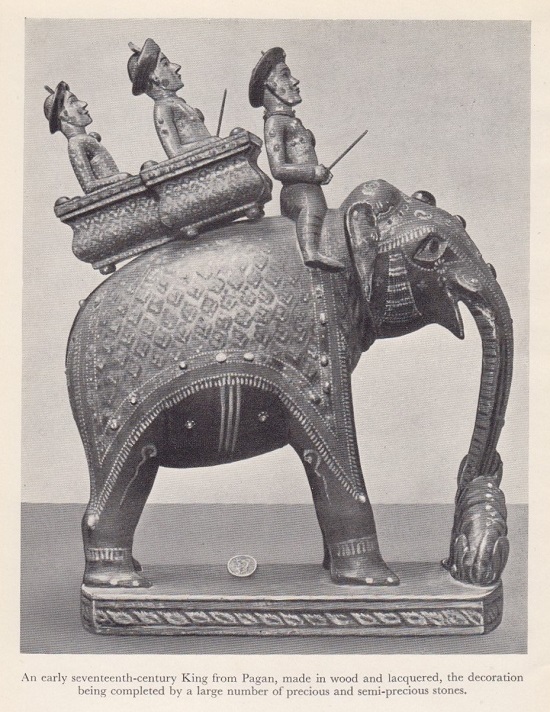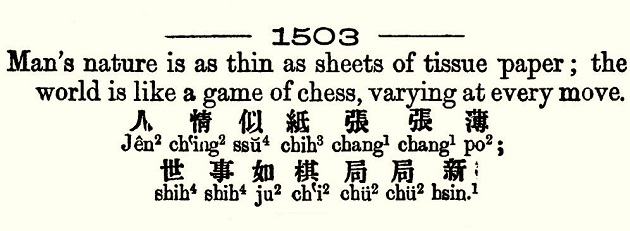
Edward Winter

Frontispiece of A Book of Chessmen by Alex Hammond (London, 1950)
A candidate for the most famous of all quotes on the game is ‘Chess is a sea in which a gnat may drink and an elephant may bathe’, but is it authentic? This ‘Indian proverb’ may have an ancient ring to it, but we have found no appearance in chess literature until Norman Knight gave it on page 145 of his anthology Chess Pieces (London, 1949). It was then picked up by other writers (e.g. by Irving Chernev, on the inside front cover of Chess Review, September 1950 as the ‘thought for the month’).
Knight’s book had a chapter entitled ‘Chess in Proverb’, containing 14 alleged specimens. Among the others were:
No additional information was provided by Knight about the origins of any of the above, and we find his entire chapter profoundly unconvincing. All 14 alleged proverbs were served up again on pages 226-229 of King, Queen and Knight by N. Knight and W. Guy (London, 1975).
(3587)
Concerning ‘Chess is a sea in which a gnat may drink and an elephant may bathe’, Christian Sánchez (Rosario, Argentina) has found that a similar quote, claimed to be an ‘old Indian proverb’, was given by George Koltanowski at the start of an article on pages 154-157 of the May 1936 issue of El Ajedrez Español:
‘La partida de ajedrez es como el Océano, donde un mosquito puede cruzar y un elefante puede ahogarse.’
As our correspondent points out, this has a different meaning: ‘The game of chess is like the ocean, which a gnat may cross and where an elephant may drown.’
It is not known in which language Koltanowski wrote his article for El Ajedrez Español or, of course, whether the ‘old Indian proverb’ had appeared in print before May 1936.
(4498)
Page 220 of The Chess Scene by D. Levy and S. Reuben (London, 1974) had a chapter headed ‘Chess is a sea in which a gnat may drink and an elephant may bathe’, which was labelled ‘Russian Proverb’.
Addition on 21 September 2024 to Cuttings:
‘This week, in a Stakhanovite effort to engender outrage, in true Graham Linehan style, I shall enter the topic of gender wars. To misquote an ancient Indian adage about chess, this is a sea in which a gnat may sink and an elephant may drown.’
‘This week, in a Stakhanovite effort to engender outrage, faux or otherwise, I shall enter the topic of gender wars. To misquote an ancient Indian adage about chess, this is a sea in which a gnat may sink and an elephant may drown.’
As shown in our Chess Proverbs feature article (and as pointed out 18 years ago), the first known record of the ‘ancient Indian adage’ is in the 1930s.
The previous, longer paragraph in Raymond Keene’s articles is also a rehash, shedding further light on what, in his mind, is ‘a Stakhanovite effort’.
Information is requested on an item given by Irving Chernev on page 14 of the October 1974 CHESS:
‘It is never safe to take the queen knight pawn with the queen – even when it is safe. (Hungarian proverb)’
(6829)
Variations on this advice were discussed in a number of C.N. items. See The Poisoned Pawn in Chess.
Regarding comparisons between chess and life see, for instance, the chapter entitled ‘The Moralities’ in A History of Chess by H.J.R. Murray (Oxford, 1913) and ‘The Morals of Chess’ by Benjamin Franklin. ‘Life is like a game of chess, changing with each move’ is often described as a ‘Chinese proverb’, but on what basis?
(8037)
From page 252 of A Collection of Chinese Proverbs translated and arranged by William Scarborough (Shanghai, 1875):

(11713)
‘No fool can play chess, and only fools do.’
Stuart Rachels (Tuscaloosa, AL, USA) notes that this was given as ‘a German proverb’ on page 262 of Maxims of Chess by John W. Collins (New York, 1978) and enquires whether that description (also to be found in other publications) is justified.
The observation was referred to as an ‘old adage’ on page 1 of The Pleasures of Chess by Assiac (New York, 1952), in a text reproduced from his New Statesman and Nation column, 1949, page 485. There was no suggestion that the sentiments emanated from Germany. Indeed, on page 7 of the German edition of the book, Vergnügliches Schachbuch (Cologne and Berlin, 1953), the phrase was said to be of English origin:
‘... wer immer von der Schachtarantel gestochen ist, wird sehr bald die Wahrheit des alten englischen Sprichworts zugeben müssen: “Ein Narr kann nicht Schach spielen, aber nur Narren tun es”.’
(8398)
Jerry Spinrad (Nashville, TN, USA) sends two citations:
‘A man must be a very clever fellow and a fool to make a really good chessplayer.’
Source: Brisbane Courier, 21 April 1884, page 3.
‘It has been said that no fool could be a first-class chessplayer, and none but a fool would be.’
Source: Sydney Mail, 6 March 1897, page 487.
(8407)
From page 313 of the 1843 Chess Player’s Chronicle:
‘There is a French proverb which says, “If you would win a damsel’s heart, always lose to her at chess”. This is probably founded on an anecdote concerning Count Ferrand of Flanders, whose wife conceived so mortal a hatred to him from their misunderstandings over the chessboard that when he was taken prisoner at the battle of Bovines she suffered him to remain in durance for a long time, though she might have easily procured his release.’
See too page 198 of the 1868 Chess World. As previously noted, the entire field of chess proverbs is murky.
(8455)
A brief second-hand chapter on proverbs was included on pages 121-122 of Caissa’s Web by Graeme Harwood (London, 1975).
To the Chess Notes main page.
To the Archives for other feature articles.
Copyright: Edward Winter. All rights reserved.